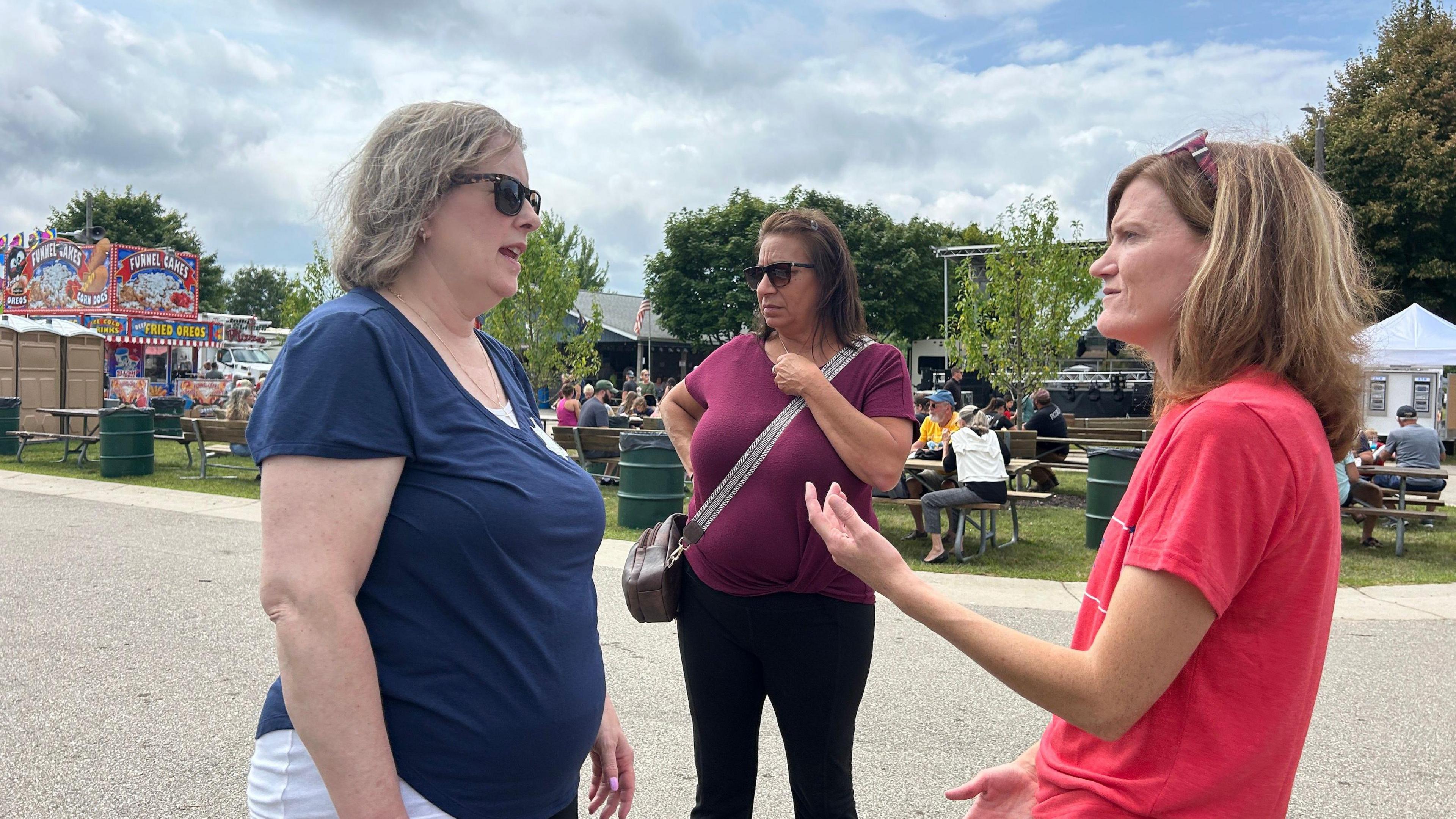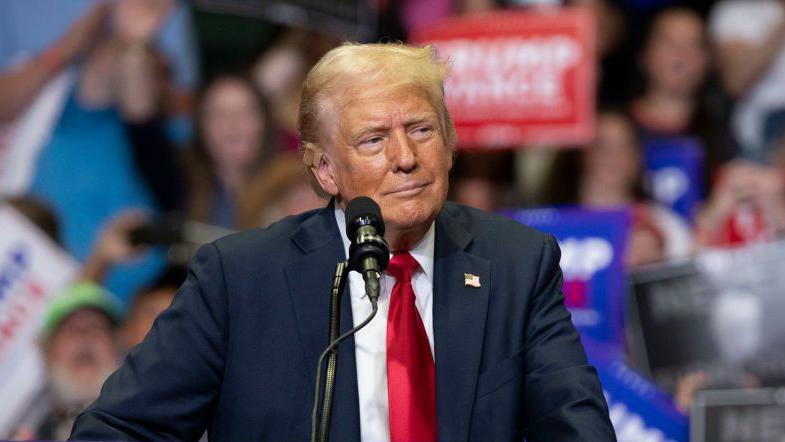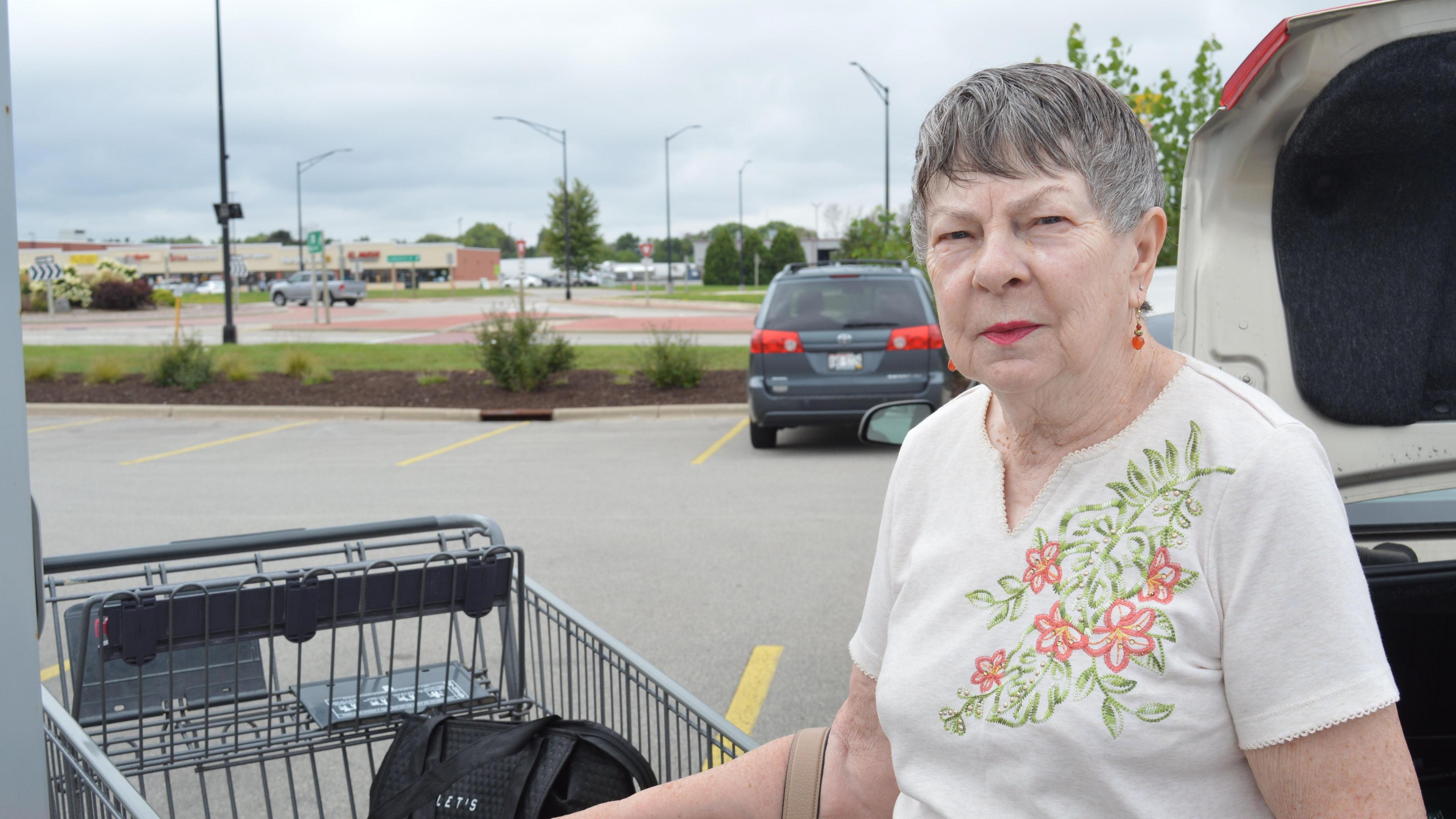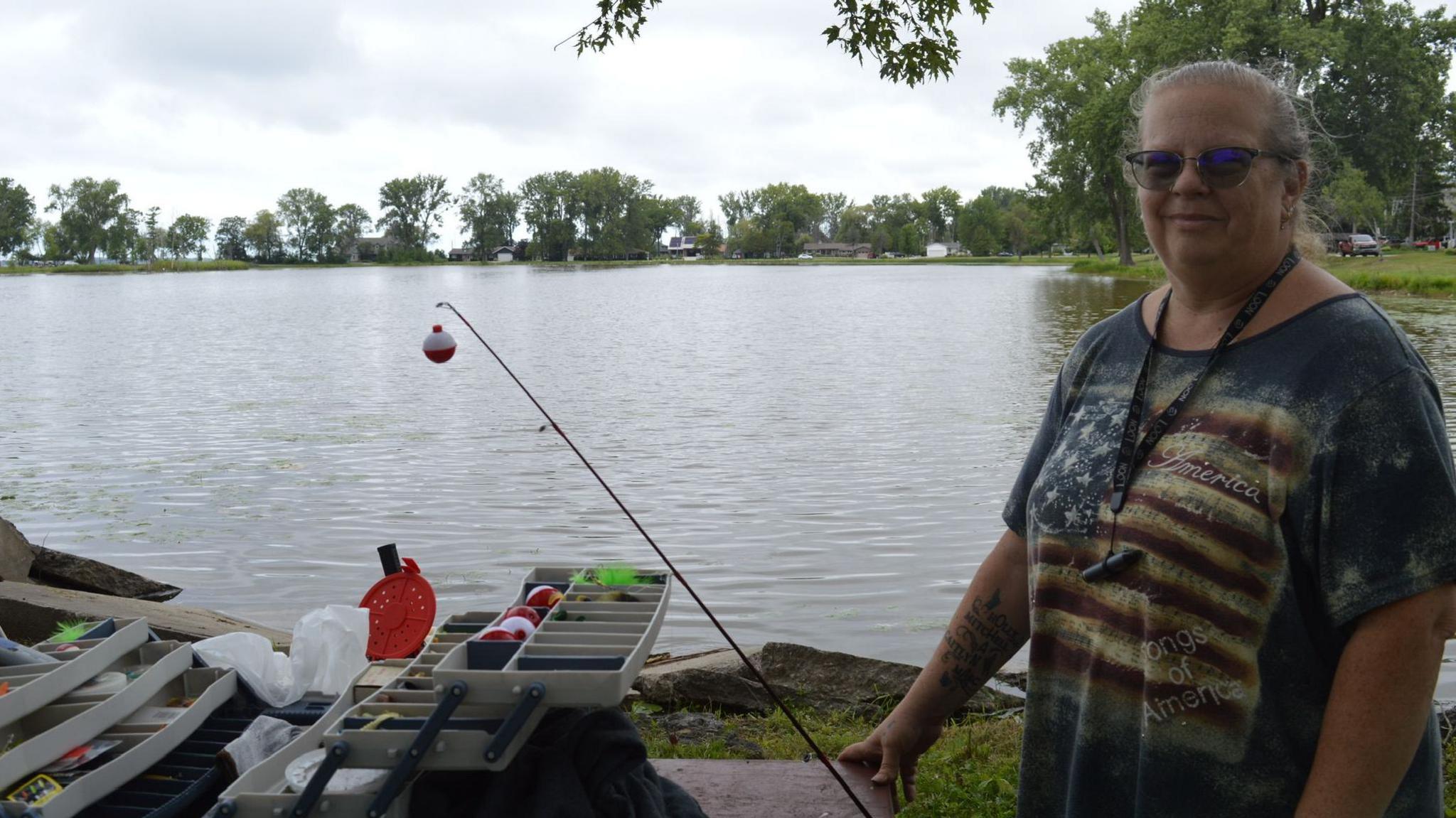Don't mention Trump - how Republicans try to sway women voters

Stephanie Soucek is at the Door County Fair to woo women to vote for Trump
- Published
Surrounded by food trucks, Ferris wheels and funnel cake stands on a hot August afternoon, Stephanie Soucek has one goal in mind.
The 42-year-old chair of the Republican Party in Door County, a bellwether district in the battleground state of Wisconsin, is at the county fair to urge undecided voters to cast a ballot for Donald Trump.
Upon meeting Tammy Conway, a Democrat who is considering voting Republican for the first time in decades, Ms Soucek begins talking about her own family’s two expensive car payments, an economic message that seems to resonate.
Ms Conway is concerned about “sky-high” housing interest rates and says Trump might make the economy “a lot less complicated”.
But as Ms Soucek lays out her case for the Republican presidential candidate, she avoids mentioning the latest spate of controversial remarks Trump has made, including personal attacks on Democratic challenger Kamala Harris.
“I try to tell people to focus on the policies and ignore the candidates,” she says, knowing that Trump’s brash personality has deterred women previously.
Republican officials in a handful of swing states – where the election is likely to be decided – are adopting Ms Soucek’s strategy of promoting policy over personality with white suburban female voters. It's a pivotal voting bloc Trump narrowly won in his first presidential race but has struggled to appeal to since.
Local Republicans say they wish Trump would adopt a similar approach against Vice-President Harris, whose campaign has been powered by female voters since she replaced Joe Biden at the top of the ticket in July.
The concern brings into focus the widening gender gap that has come to define the election. Trump is courting young – especially black and Hispanic – men while Democrats are working to attract female voters motivated by the overturning of Roe v Wade, a landmark Supreme Court ruling that had enshrined the constitutional right to an abortion.
An ABC News/Ipsos poll released in September suggested the vice-president led the former president 54% to 41% among women - a seven-point jump since the Democratic National Convention late last month.
It has some Republicans worried about whether Trump can reverse the trend, Ms Soucek says.

Ms Soucek (right) talks to Ms Conway (left) about the economy next to cheese curd food trucks at the fair
Defending a ‘brash’ candidate
Trump campaign spokesperson Karoline Leavitt said Ms Harris had "implemented dangerously liberal policies that have left women worse off financially and far less safe than we were four years ago under President Trump”.
But some who spoke to the BBC said his campaign had remained fixated on men - not women.
Republican pollster Christine Matthews said Trump’s team is “doubling down on a strategy of motivating the Maga base and hoping to motivate men - particularly non-college-educated men including those who are Hispanic in addition to white - in a way that will overpower the gender gap”.
The Trump campaign has leaned into “bro culture”, emphasising masculinity and a contrast of “weak versus tough”, said Chuck Coughlin, a political strategist who works with Republicans in the battleground state of Arizona.
“That appeals to a lot of men,” he said. “It doesn’t appeal to unaffiliated voters.”
Trump’s choice of JD Vance as his running mate reinforced how the campaign is prioritising outreach to men. They may not have expected his addition to the ticket to have been so damaging with women voters, however.
The Ohio senator has faced a backlash over previous comments about women, in particular a 2021 clip in which he calls several Democrats, including Ms Harris, “childless cat ladies who are miserable at their own lives”.
These types of comments do not help attract swing women voters, according to Betsy Fischer Martin, executive director of the nonpartisan Women & Politics Institute.
“There are plenty of childless cat ladies voting in the suburbs,” she said.
But the former president’s campaign rhetoric does not bother some ardent female supporters like Dixie, a 59-year-old Republican from Door County.
“He’s not going to tell you what you want to hear. He’s going to tell you the truth,” said Dixie, who declined to share her last name for privacy reasons.
Former Trump adviser Kellyanne Conway, who served as his 2016 campaign manager, told the BBC that voters could not have his policies without his “strong and resolute and tough” personality.
“People, and particularly women, tend to kvetch and converse and complain about what offends them, and then they vote according to what affects them,” she said.

Trump's personality turns off some women voters, local Republican leaders say
Grocery prices over personal gripes
Local Republicans in battleground states are hoping to stop the erosion of female support by steering the conversation back to issues that affect families on a daily basis, like crime and the economy, where polls suggest the party is more popular.
The effects of the Covid-19 pandemic make it difficult to compare how the US economy performed under the Trump and Biden administrations. While both enjoyed notable economic growth, inflation has been a persistent problem in the last three years as wages have struggled to keep up with rising prices.
And a recent KFF poll indicated inflation was the top issue in this race for 40% of suburban women voters.
For Lyla Juntunen, 88, a former stay-at-home mom from the suburbs of Green Bay, Wisconsin, the price increases under Mr Biden have been hard to ignore.
“Look at these groceries that you get and how much you pay,” she told the BBC, gesturing toward a full shopping cart in a grocery store car park.
In one US state, women politicians dominate. What pointers can it offer Kamala Harris?
- Published3 August 2024
Is US economy better or worse now than under Trump?
- Published3 September 2024
Kamala Harris has thrived in debates - will her tactics work on Trump?
- Published7 September 2024
Strategists say Trump would do well to focus more on these specific economic policy points to win over voters like Ms Juntenen.
"If he dials down the attacks and his brand of fiery kind of politics, then he can pick up...female voters in particular," said Ariel Hill-Davis, co-founder of Republican Women for Progress, which advocates for female representation in the party.
"If your top three issues are the economy, inflation, public safety, I think he could easily sway those voters."

Lyla Juntunen is a suburban woman who is fed up with rising food prices
‘Staying the hell away’ from abortion
Republicans in swing states have struggled with another issue that has animated women across the country: reproductive rights.
Democrats have seized on abortion rights as a way to galvanise voters after the fall of Roe v Wade in 2022, while Ms Harris has become the White House’s leading voice on the issue.
Voters in several states - including Republican strongholds - have passed referendums protecting the right to abortion. The issue is on the ballot in at least eight states in November, including in the battleground territories of Nevada and Arizona.
Republicans have struggled to reach a unified message on reproductive rights. Trump has repeatedly said policy should be left up to the states, declining to endorse a national abortion ban that many Republican lawmakers support.
He was roundly criticised by anti-abortion conservatives in recent weeks after giving contradictory remarks on whether he would support a referendum in Florida to protect abortion rights - he later clarified he would vote against it.
The same week, he told a Michigan crowd that if he were re-elected, his administration would cover the costs of IVF, a fertility treatment that Democrats have claimed Republicans are trying to take away through restrictive state abortion laws.
Tom Eddy, the chair of the Erie County Republican Party, a swing district in the must-win state of Pennsylvania, said he’d found the best approach is to avoid the issue altogether.
“I tell my candidates, ‘Stay the hell away from it,’” he said. “I can tell no matter what policy you promote with regard to abortion, you’re going to be wrong, because half the people are going to think the other way.”
Though the KFF poll indicated abortion to be lower on the list of priorities for female suburban voters - behind immigration, border security and the economy - it remains a motivating issue for a growing share.
A survey from the New York Times and Siena College last month suggested it had become the most important issue for female voters under the age of 45.
With polls suggesting the majority of suburban women support access to abortions, Ms Soucek said the Republican Party needs to find a unified message.
“It’s just a matter of making sure that we’re sending the right message to women that we care about women, while also caring about unborn babies,” she said.
Mr Trump’s former senior adviser, Kellyanne Conway, said that while Democrats are focused on “the waist down”, the Republican Party is concentrating on the “waist up”.
“We women, from the waist up, are where our brains, ears, eyes, hearts and mouths are, so we can figure out all the issues: the kitchen table economics, entrepreneurship, taxes, regulation, energy independence,” she said.
But that language isn’t landing with all women voters in Wisconsin.
Holly Rupnow, a 56-year-old former Republican from Green Bay, said one of the reasons she planned to vote for Ms Harris was because of reproductive rights.
“I like the things that she’s going to try to do for us - get us back women’s rights,” she said.

Holly Rupnow has voted for Republicans in the past, but abortion rights are pushing her toward Ms Harris
Letting ‘Trump be Trump’?
Experts say the political landscape has changed dramatically since Donald Trump first ran for president.
Some female voters in 2016 brushed aside their worries about Trump, believing he would act differently once he was in the White House, according to Ms Fischer Martin.
But the 2016 “Let Trump be Trump” rallying cry would not work now, she said.
During the 2018 midterm elections, suburban and college-educated women largely rejected Trump and Republicans and helped power the so-called blue wave that elected more than 100 women to the US House.
In 2022, reproductive rights played a central role in helping Democrats perform better than expected, raising fears among Republicans it could do so again.
Trump could make strides with female suburban voters by directly addressing their concerns about his personality, according to political experts.
“If he were to say something like: ‘You may not like me personally, you may not like my rhetoric, but if you want to worry less about grocery bills .. I'm your guy,’” Ms Fischer Martin said.
“I don't know if he's quite capable of getting there.”
Kellyanne Conway knows Trump better than most. She believes his core message - are voters better off now then when he was in office? - is the same for all Americans, regardless of gender.
“As I told him recently,” she added, “He beat a woman before. He can beat a woman again.”

More on the US election
SIMPLE GUIDE: Everything you need to know about the vote
IMMIGRATION: Could Trump really deport a million migrants?
FACT CHECK: Was US economy stronger or weaker under Trump?